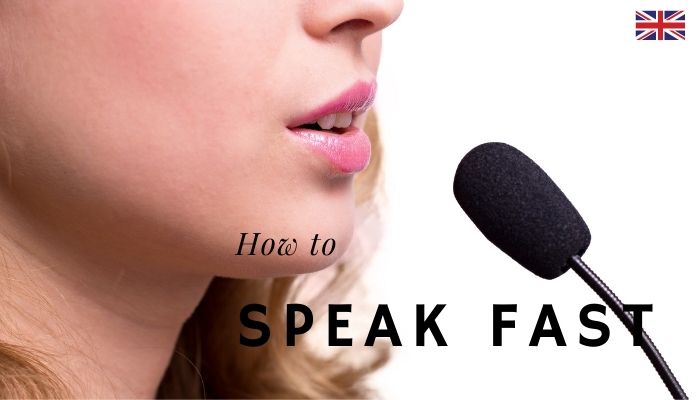


A lot of English learners notice that native English speakers tend to speak fast, so they think that speaking faster will help their English sound more fluent. But you have to be careful – it can be dangerous to try to speak very fast in English if you don’t follow these tips.
Why? Well, there are two reasons. First of all, if your pronunciation is not clear, then speaking faster is just going to make things worse – and other people won’t understand you.
And second, speaking especially fast can sometimes give the impression that you’re nervous or insecure, that you’re not confident. This tip applies to native English speakers, too – when someone is speaking a mile a minute (meaning very fast) it can make them seem like they’re nervous or uncomfortable, or not really thinking about what they’re saying. So, like I said, be careful not to go overboard (don’t do too much) in increasing your speaking speed.
Learn How to Improve Your English Fluency and How To Speak English Faster with Common Informal Contractions in English.
For example:
• What are you going to do?
• Whatcha going to do?
• Whatcha gonna do?
or
• Do you want a beer?
• Do you wanna beer?
• D’you wanna beer?
• D’ya wanna beer?
• Ya wanna beer?
• Wanna beer?
COMMON INFORMAL CONTRACTIONS TO SOUND LIKE A NATIVE
Informal contractions are when we combine two or more high frequency words in order to make them go more quickly and be easier to say. Native speakers do this automatically. We’re used to stressing important words and reducing ones that don’t matter.
1. Ain’t = Am not/are not/is not
E.g. She ain’t hungry.
2. Ain’t = Has not/have not
E.g. He ain’t done it yet.
3. Wanna = Want to
E.g. I wanna go home.
4. Wanna = Want a
E.g. I wanna coffee.
5. Whatcha = What have you
E.g. Whatcha got there?
6. Kinda = Kind of
E.g. Anna’s kinda cute.
7. Sorta = Sort of
E.g. She’s sorta tired.
8. Outta = Out of
E.g. I’m outta money.
9. Alotta = A lot of
E.g. I eat alotta chocolate.
10. Lotsa = Lots of
E.g. He has lotsa money.
11. Mucha = Much of
E.g. It’s not mucha a surprise, is it?
12. Cuppa = Cup of
E.g. Would you like a cuppa tea?
13. Dunno = Don’t know
E.g. I dunno.
14. Lemme = Let me
E.g. Lemme see!
15. Gimme = Give me
E.g. Gimme the book!
16. Tell’em = Tell them
E.g. We should tell’em the truth.
17. Cos = Because
E.g. I cry cos I’m in pain.
18. Innit? = Isn’t it?
E.g. It’s blue, innit?
19. I’mma = I’m going to
E.g. I’mma talk to my mother.
20. Gonna = Going to
E.g. I’m gonna tell you the truth.
21. Needa = Need to
E.g. You needa know about Jame.
22. Oughta = Ought to
E.g. You oughta phone your brother.
23. Hafta = Have to
E.g. We hafta go.
24. Hasta = Has to
E.g. John hasta work today.
25. Usta = Used to
E.g. She usta live in France.
26. Supposta = Supposed to
E.g. I’m supposta start a new job on Monday.
27. Cmon = Come on
E.g. Cmon, let’s do it together!
28. Ya = You/ you are
E.g. I miss ya.
29. Gotta = (have) got a
E.g. Have you gotta phone?
30. Shoulda = Should have
E.g. She shoulda called yesterday.
31. Shouldna = Shouldn’t have
E.g. I’m sorry, I shouldna told you that.
32. Wouldna = Wouldn’t have
E.g. I wouldna done that if I were you.
33. She’da = She would have
E.g. She’da been prepared for class.
34. Coulda = Could have
E.g. He coulda been here by 5:00.
35. Woulda = Would have
E.g. He woulda arrived soon.
36. Mighta = Might have
E.g. You mighta left the book at the airport.
37. Mightna = Mightn’t have
E.g. She mightna caught her train.
38. Musta = Must have
E.g. She musta been in a hurry.
39. Mussna = Must not have
E.g. You mussna stolen the money.
40. Dontcha = Don’t you
E.g. Dontcha see it?
41. Wontcha = Won’t you
E.g. Wontcha watch this film?
42. Whatcha = What are you
E.g. Whatcha doing?
43. Betcha = Bet you
E.g. Betcha can’t guess who she is!
44. Gotcha = Got you
E.g. We gotcha!
45. D’you = Do you
E.g. D’you like him?
46. Didntcha = Didn’t you
E.g. Didntcha like this book?
47. S’more = Some more
E.g. I will need s’more time.
After reading this article, I hope you feel much more confident understanding and eventually using these informal contractions.






















